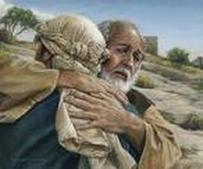Cultural Insights
into the Prodigal Son ~ Luke 15.13-19

Decades of life and ministry in the Middle East and a lifelong fascination with the parable of the Prodigal Son have combined to give Kenneth Bailey a unique perspective
on the parable. We find his insights in several excellent books:
Kenneth E. Bailey, The Cross & the Prodigal, IVP, 1973, 2005.
_______________, Finding the Lost, 1992.
_______________, Jacob and the Prodigal, 2003
Two of Bailey's basic convictions are found in the following statements:
1) “The culture of the speaker must be penetrated if what is said is to be understood. Even so with the life and
teachings of Jesus.” (The Cross & the Prodigal, 11)
2) "Middle Eastern culture was a better lens through which to examine the parables of Jesus than my inherited
contemporary American culture.” (The Cross & the Prodigal, 11)
Reading Assignment ~ Read The Cross & the Prodigal, pages 26-89.
Luke 15.13-19
1) Read Luke 15.13-19, the next scene in the parable of the Prodigal Son, carefully.
2) Look over the following questions:
1) What were the cultural implications of the younger son "gathering all that he had"?
2) What should we assume about the cultural identity of the people of the "far country"?
3) How/why might he had "squandered all his money in spendthrift living"?
4) When he spent all his money and the famine struck, why didn't he just go home?
5) What are the implications of "no one gave him anything"?
6) What could we assume about the "citizen" ethnically and economically?
7) What is the significance of "feeding pigs" and wanting to eat their food?
8) Why mention "bread" so prominently?
9) What is the significant about his plan to become one of his father's "hired workers"?
3) Consider insights you have gained from your reading assignment that speak to these questions and help us
understand the cultural setting of this scene in the parable of the Prodigal Son.
4) Double-check your memory by reading through the answers/insights found at this link.
STEPPING OUT ~ Compose a 100-200 word devotional based on one insight you have gained into the cultural
context of this section of the parable of the Prodigal Son.
